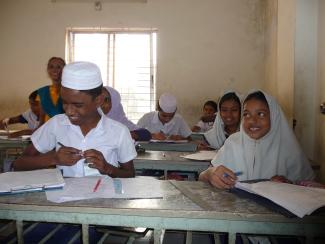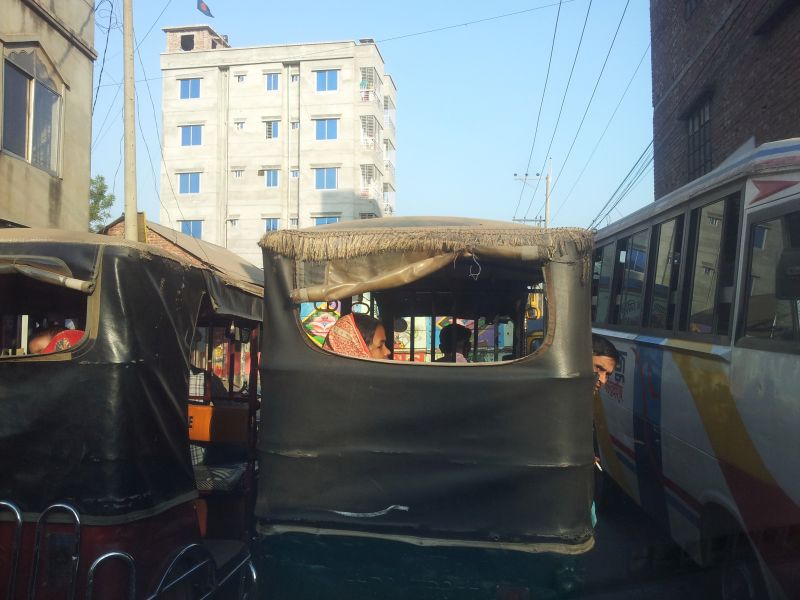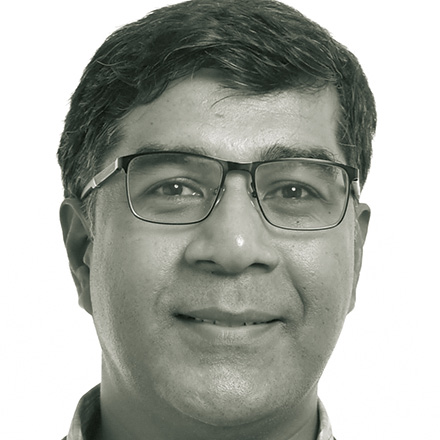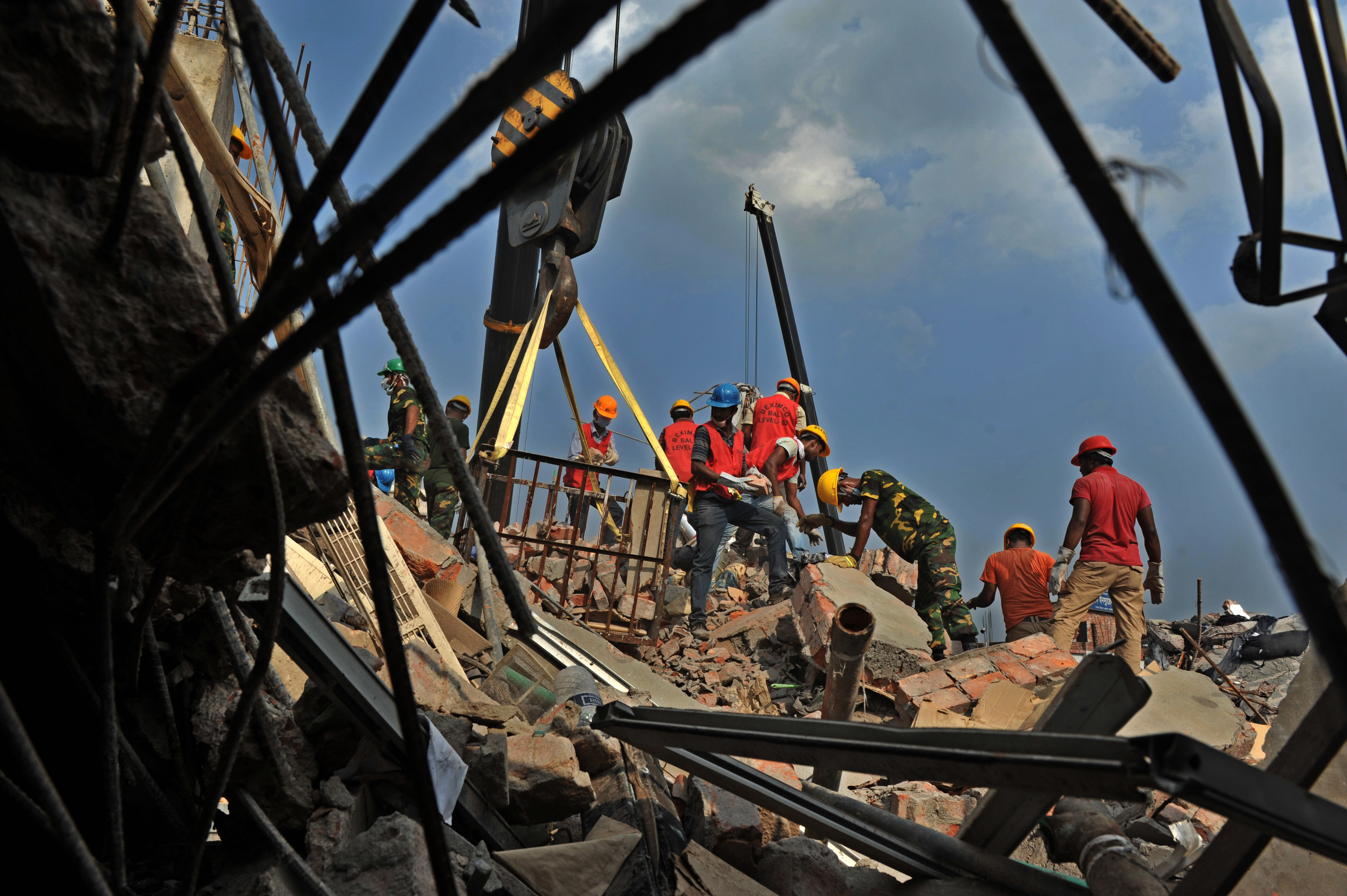Primary education
School for slum children

To Europeans, the classrooms look tiny, but that is not unusual in Bangladesh. What matters is that there are enough desks and seats. All children have places of their own. Moreover, every classroom has a blackboard, electric light and a fan, which is needed in Bangladesh’s hot climate. The basics for teaching are all in place.
The Glory Future Model School (GFMS) is not like any other school. Its mission is to support some 750 kids from disadvantaged families. The school relies on funds from two European non-governmental organisations, the Austrian Doctors for the Third World and the German Doctors for the Third World. A team from Psychologen über Grenzen (Psychologists beyond borders), another independent organisation, evaluated the school in 2010. The follow-up is planned for 2014 at the latest.
For lunch, all GFMS children get a warm meal and safe drinking water, neither of which is to be taken for granted in the area. The effort is worthwhile and serves an educational purpose. Food and drink serve as an incentive for parents to send their offspring to school rather than to work.
The school does not charge tuition fees, which matters to the parents very much. The dropout rate is about 10 %, below the national average of about 12 %.
Strong commitment
In Bangladesh, many schools are so bad that parents are not interested in the children attending regularly. The mothers and fathers of GFMS children, however, have begun to rate teaching highly. The school has a very good reputation in the neighbourhood.
Teachers are even prepared to tutor children after classes, thus helping the kids prepare for exams. The GFMS pays its teachers reasonably. Many of them are from slums themselves, which adds to their motivation. The school runs a health centre, which serves the community as well as the teachers and further boosts teachers’ identification with the institution they work for.
In Bangladesh, teachers are normally poorly paid and have to step up their modest incomes by tutoring after school. This setting is a perverse incentive no to do their jobs well because their opportunities for making additional moneys dwindle the more the kids learn in
school.
At the GFMS, all staff treat the children with respect, taking good care of them regardless of their social standing. The teachers are highly motivated and comparatively well trained. In the afternoons, there are classes with vocational relevance that teach hairdressing or sewing clothes for instance. These classes are held in bigger rooms, which, according to the evaluators, should be used for standard classes as well.
Vocational skills are very important. People who have them normally find good jobs and do not have to make a living as rickshaw drivers or street vendors. The GFMS emphasises skills training so its pupils will be able to find well-paid work as adults and support their families.
Among the poor, rickshaw drivers are not looked down upon, by the way, since they are making money. But a simple diarrhoea infection, which is not uncommon given the hygienic situation, can throw them off course. A serious illness, moreover, means that an entire family’s livelihood is in danger. The men concerned are disgraced, and many prefer leaving their families to living in shame.
It would be an over-ambitious goal to make all children escape from the slum. It is obvious, however, that those who know how to repair household appliances, understand plumbing or are skilled in textiles production find good opportunities. The tough labour conditions in Dhaka’s garments industry, for which western retail chains are at least partially responsible, may be the target of harsh criticism in Europe, but for people from Dhaka’s slums finding a job there means upward mobility.
The GFMS can be improved. The teachers should teach fewer lessons and fewer children. So far, they are only up to their jobs thanks to their excellent motivation. In the long run, their work burden should be reduced, so more teachers are needed. The hierarchical organisation of the school should be modified too. It is important to involve the staff in decision making and doing so is compatible with local traditions.
It would make sense, moreover, to use modern educational methods, for instance by putting lively posters on the walls of the classrooms. Bangladesh’s Ministry of Education would be in favour of such approaches and prepared to support them. The evaluators also found that it would be good to put more emphasis on the learning of the English language. Doing so would allow the school to use up-to-date, international text books, with a positive impact on many other subjects such as science for instance.
Tom Frenzel
is the chief executive of Psychologen über Grenzen (Psychologists beyond borders).
http://www.psychologen-ueber-grenzen.org
Svetla Dimitrov
is doing voluntary work with Psychologen über Grenzen.
svetla.dimitrov@psychologen-ueber-grenzen.org
Till Voigts
is assistant to the management of Psychologen über Grenzen.
till.voigts@psychologen-ueber-grenzen.org











